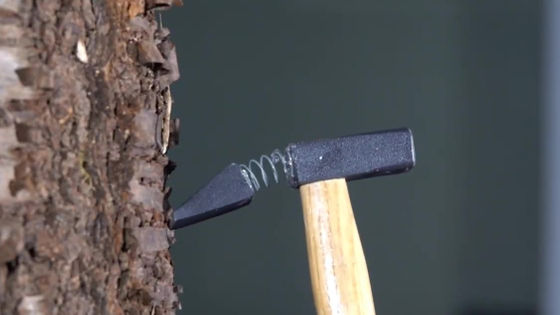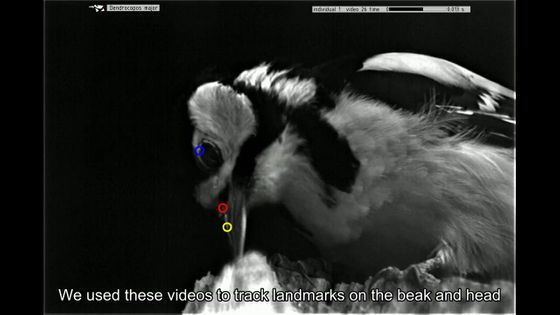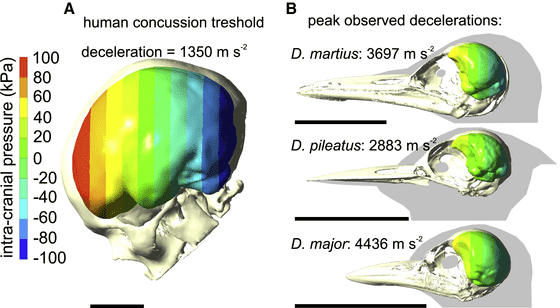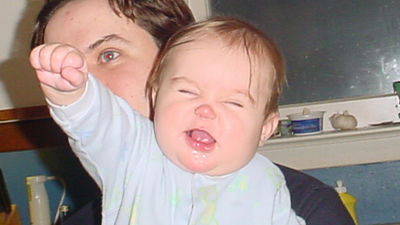The mystery of 'How does the woodpecker protect the brain from impact?' Was solved, and there was no need to protect it in the first place

Woodpeckers dig holes in tree trunks to search for insects to feed on and build burrows. It's well above 100G, which can cause a human to have a concussion. Research results have been announced as to why the brain of such a woodpecker is safe.
Woodpeckers minimize cranial absorption of shocks: Current Biology
https://doi.org/10.1016/j.cub.2022.05.052
Study sheds light on woodpecker brain theory - RMOToday.com
https://www.rmotoday.com/beyond-local/study-sheds-light-on-woodpecker-brain-theory-5616865
Why woodpeckers don't mind pecking with their faces | Deccan Herald
https://www.deccanherald.com/science-and-environment/why-woodpeckers-don-t-mind-pecking-with-their-faces-1127160.html
The conundrum, ``Why doesn't a woodpecker banging its head against a tree at high speeds give you headaches?'' has been a headache for scientists for many years. In the past, Professor Ivan R. Schwab, an ophthalmologist at the University of California, Davis, published a paper stating that ``woodpeckers do not get headaches because the sponge-like tissue in their muscles and skulls absorbs impact.'' and won the 2006 Ig Nobel Prize for Ornithology.
The Ig Nobel Prize is sometimes considered not a very prestigious award, but until recently, the theory that woodpeckers have a mechanism to absorb shock has been told as an established theory. However, Sam Van Wassenbergh, a biologist at the University of Antwerp, Belgium, waited for this theory. ``For example, a hammer with a built-in shock absorber would be useless,'' he said, wondering if the woodpecker would not hit the tree well if the shock was absorbed.

Therefore, the research team of Van
We then added markers to the two beaks and the eyes to track their movements. If, as is commonly believed, the impact is absorbed by the bones at the base of the skull and beak, the eye should slow down after a short delay after the beak hits the tree and stops moving.

Analysis showed that the woodpecker's beak and eyes slowed down at the same time. This means that the woodpecker does not absorb any shock as it strikes the tree with its beak. Van Wassenbergh said of the results, ``If the woodpecker was absorbing some of the impact it had on the tree, it would be wasting precious energy. It should have evolved over millions of years.'
Van Wassenbergh, who found that the woodpecker did not absorb the impact when poking the tree, then created a computer model of the woodpecker's head and conducted a simulation experiment. As a result, it was confirmed that the ability to make a hole in the tree with the beak decreased when the impact was absorbed by the skull.
The simulation also found that the pressure on the woodpecker's brain when picking a tree is far below the level at which the brain is damaged. This means that the woodpecker's brain is too small to be damaged by the impact of a peck on a tree.

According to the research team, in order for a woodpecker to cause a concussion, it must poke a tree twice as fast as normal, or poke an object four times harder than a natural tree. About this, Van Wassenbergh said, ``Many people forget that woodpeckers are much smaller than humans. It can withstand severe slowdowns.”
Based on the findings of this study, the research team said in their paper, ``It is highly likely that the woodpecker's head functions as a hard hammer rather than a shock-absorbing helmet, maximizing the pecking force. 'Despite the lack of biological evidence that woodpeckers absorb shock when they peck trees, developers of tools such as shock absorbers and helmets have long studied the ecology of woodpeckers. I have been referring to it, ”he said, suggesting that manufacturers of helmets and protective equipment inspired by woodpeckers will be forced to review their designs in the future.
Related Posts:







